Self-employed or an employee?
advertisement
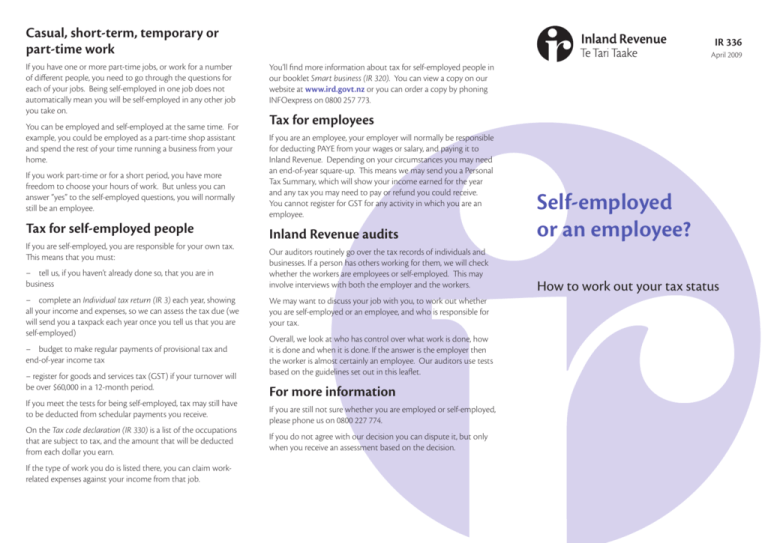
Casual, short-term, temporary or part-time work If you have one or more part-time jobs, or work for a number of different people, you need to go through the questions for each of your jobs. Being self-employed in one job does not automatically mean you will be self-employed in any other job you take on. You can be employed and self-employed at the same time. For example, you could be employed as a part-time shop assistant and spend the rest of your time running a business from your home. If you work part-time or for a short period, you have more freedom to choose your hours of work. But unless you can answer “yes” to the self-employed questions, you will normally still be an employee. Tax for self-employed people If you are self-employed, you are responsible for your own tax. This means that you must: – tell us, if you haven’t already done so, that you are in business – complete an Individual tax return (IR 3) each year, showing all your income and expenses, so we can assess the tax due (we will send you a taxpack each year once you tell us that you are self-employed) – budget to make regular payments of provisional tax and end-of-year income tax – register for goods and services tax (GST) if your turnover will be over $60,000 in a 12-month period. If you meet the tests for being self-employed, tax may still have to be deducted from schedular payments you receive. On the Tax code declaration (IR 330) is a list of the occupations that are subject to tax, and the amount that will be deducted from each dollar you earn. If the type of work you do is listed there, you can claim workrelated expenses against your income from that job. IR 336 April 2009 You’ll find more information about tax for self-employed people in our booklet Smart business (IR 320). You can view a copy on our website at www.ird.govt.nz or you can order a copy by phoning INFOexpress on 0800 257 773. Tax for employees If you are an employee, your employer will normally be responsible for deducting PAYE from your wages or salary, and paying it to Inland Revenue. Depending on your circumstances you may need an end-of-year square-up. This means we may send you a Personal Tax Summary, which will show your income earned for the year and any tax you may need to pay or refund you could receive. You cannot register for GST for any activity in which you are an employee. Inland Revenue audits Our auditors routinely go over the tax records of individuals and businesses. If a person has others working for them, we will check whether the workers are employees or self-employed. This may involve interviews with both the employer and the workers. We may want to discuss your job with you, to work out whether you are self-employed or an employee, and who is responsible for your tax. Overall, we look at who has control over what work is done, how it is done and when it is done. If the answer is the employer then the worker is almost certainly an employee. Our auditors use tests based on the guidelines set out in this leaflet. For more information If you are still not sure whether you are employed or self-employed, please phone us on 0800 227 774. If you do not agree with our decision you can dispute it, but only when you receive an assessment based on the decision. Self-employed or an employee? How to work out your tax status Introduction Self employment guidelines Employee guidelines It is important to know if you are employed or self-employed, because the tax and Accident Compensation laws treat the two groups of people differently. This leaflet will help you find out whether you are employed or self-employed. It also explains the tax differences between the two. If you can answer “yes” to most of the following questions, it will usually mean that you are self-employed. If you can answer “yes” to most of the following questions, you are probably an employee. • • Do you have to do the work yourself, rather than hiring someone else to do it for you? The terms “employment” and “self-employment” are not defined in the tax laws, and there is no single test for deciding between them. You can decide whether you are employed or self-employed by looking at the work you do and the way you do it. The decision can’t be made just because you or your employer call your job “employment” or “self-employment”. If you have a contract with the person who pays you, you might be described in it as an “independent contractor”, or as “selfemployed”, or similar. This doesn’t mean you will automatically be self-employed. The working conditions set out in the contract (or agreed verbally) will determine your status, not the way you are described. Guidelines When deciding whether you are employed or self employed in most cases the answer will be obvious. For example, if you are working for a company on a factory production line, doing a job set by your boss, you are employed. You are self-employed if you are in business on your own account, such as running your own dairy. If you have a number of jobs, you need to apply the guidelines to each one. If you are employed or self-employed in one job, it does not automatically mean the same will apply to your other job(s). Consider the main conditions of that job that govern the way you work. Do you decide or control how you do the work? For example: – when you take holidays – when, where and what hours you work – the standard or quality of work – how much you get paid and how. • Do you invest or risk your own money in the activity in any way? For example: – Could you sell the business? – Do you support the business with your own money? For example, have you lent it money, or provided any working capital? (Excluding shares obtained from any employee share purchase plan). – Are you responsible for losses or your own bad management? – Are you responsible for management and investment decisions for the business? • Do you provide the major assets or working equipment needed for your job, (not just small tools, work clothing and/or vehicle to get to and from work)? • Do you provide or pay for your own training? • Are you responsible for getting the work done? – Can you get other people to work with or for you, without needing to get permission from anyone else? – Do you pay these people from your own funds? – Are you free to do work for other people? – Do you advertise on your own account? – Do you arrange for someone else to do the job if you can’t (for example, if you are sick)? – Does your work contract say you’ll be penalised if you stopped work, or left without completing a particular project? – Do you have to correct unsatisfactory work in your own time and at your own expense? • Can someone tell you at any time what to do on the job, or when and how to do it? • Are you paid at a set rate (for example, hourly, weekly, monthly, or per unit of production)? • Can you get overtime pay or penal rates? (Please note that even if you are paid by commission or on a piecework basis you may still be an employee, especially if there are other people at your job who work on the same basis.) • Do you work set hours, or a given number of hours a week or month? • Does someone else set the standards for the amount and quality of your sales or output? • Do you work at the premises of the person you are working for, or somewhere that person decides? • Are other people who do the same sort of job as you treated as employees? • Are you under an employment contract (either individual or collective), or any law that says how your relationship with your “employer” should be run? • Are you prevented from doing work for anyone else? • Do you have to follow the rules or procedures of the person you are working for? If you answered yes to most or all of these questions, but you are not treated as an employee (with PAYE deducted from your pay), you will need to contact Inland Revenue. We will help you sort things out with your employer, so your income is taxed correctly. Note The questions listed above are only guidelines, and your job might not fit completely into either set. If you are still unsure, phone us on 0800 227 774. Introduction Self employment guidelines Employee guidelines It is important to know if you are employed or self-employed, because the tax and Accident Compensation laws treat the two groups of people differently. This leaflet will help you find out whether you are employed or self-employed. It also explains the tax differences between the two. If you can answer “yes” to most of the following questions, it will usually mean that you are self-employed. If you can answer “yes” to most of the following questions, you are probably an employee. • • Do you have to do the work yourself, rather than hiring someone else to do it for you? The terms “employment” and “self-employment” are not defined in the tax laws, and there is no single test for deciding between them. You can decide whether you are employed or self-employed by looking at the work you do and the way you do it. The decision can’t be made just because you or your employer call your job “employment” or “self-employment”. If you have a contract with the person who pays you, you might be described in it as an “independent contractor”, or as “selfemployed”, or similar. This doesn’t mean you will automatically be self-employed. The working conditions set out in the contract (or agreed verbally) will determine your status, not the way you are described. Guidelines When deciding whether you are employed or self employed in most cases the answer will be obvious. For example, if you are working for a company on a factory production line, doing a job set by your boss, you are employed. You are self-employed if you are in business on your own account, such as running your own dairy. If you have a number of jobs, you need to apply the guidelines to each one. If you are employed or self-employed in one job, it does not automatically mean the same will apply to your other job(s). Consider the main conditions of that job that govern the way you work. Do you decide or control how you do the work? For example: – when you take holidays – when, where and what hours you work – the standard or quality of work – how much you get paid and how. • Do you invest or risk your own money in the activity in any way? For example: – Could you sell the business? – Do you support the business with your own money? For example, have you lent it money, or provided any working capital? (Excluding shares obtained from any employee share purchase plan). – Are you responsible for losses or your own bad management? – Are you responsible for management and investment decisions for the business? • Do you provide the major assets or working equipment needed for your job, (not just small tools, work clothing and/or vehicle to get to and from work)? • Do you provide or pay for your own training? • Are you responsible for getting the work done? – Can you get other people to work with or for you, without needing to get permission from anyone else? – Do you pay these people from your own funds? – Are you free to do work for other people? – Do you advertise on your own account? – Do you arrange for someone else to do the job if you can’t (for example, if you are sick)? – Does your work contract say you’ll be penalised if you stopped work, or left without completing a particular project? – Do you have to correct unsatisfactory work in your own time and at your own expense? • Can someone tell you at any time what to do on the job, or when and how to do it? • Are you paid at a set rate (for example, hourly, weekly, monthly, or per unit of production)? • Can you get overtime pay or penal rates? (Please note that even if you are paid by commission or on a piecework basis you may still be an employee, especially if there are other people at your job who work on the same basis.) • Do you work set hours, or a given number of hours a week or month? • Does someone else set the standards for the amount and quality of your sales or output? • Do you work at the premises of the person you are working for, or somewhere that person decides? • Are other people who do the same sort of job as you treated as employees? • Are you under an employment contract (either individual or collective), or any law that says how your relationship with your “employer” should be run? • Are you prevented from doing work for anyone else? • Do you have to follow the rules or procedures of the person you are working for? If you answered yes to most or all of these questions, but you are not treated as an employee (with PAYE deducted from your pay), you will need to contact Inland Revenue. We will help you sort things out with your employer, so your income is taxed correctly. Note The questions listed above are only guidelines, and your job might not fit completely into either set. If you are still unsure, phone us on 0800 227 774. Introduction Self employment guidelines Employee guidelines It is important to know if you are employed or self-employed, because the tax and Accident Compensation laws treat the two groups of people differently. This leaflet will help you find out whether you are employed or self-employed. It also explains the tax differences between the two. If you can answer “yes” to most of the following questions, it will usually mean that you are self-employed. If you can answer “yes” to most of the following questions, you are probably an employee. • • Do you have to do the work yourself, rather than hiring someone else to do it for you? The terms “employment” and “self-employment” are not defined in the tax laws, and there is no single test for deciding between them. You can decide whether you are employed or self-employed by looking at the work you do and the way you do it. The decision can’t be made just because you or your employer call your job “employment” or “self-employment”. If you have a contract with the person who pays you, you might be described in it as an “independent contractor”, or as “selfemployed”, or similar. This doesn’t mean you will automatically be self-employed. The working conditions set out in the contract (or agreed verbally) will determine your status, not the way you are described. Guidelines When deciding whether you are employed or self employed in most cases the answer will be obvious. For example, if you are working for a company on a factory production line, doing a job set by your boss, you are employed. You are self-employed if you are in business on your own account, such as running your own dairy. If you have a number of jobs, you need to apply the guidelines to each one. If you are employed or self-employed in one job, it does not automatically mean the same will apply to your other job(s). Consider the main conditions of that job that govern the way you work. Do you decide or control how you do the work? For example: – when you take holidays – when, where and what hours you work – the standard or quality of work – how much you get paid and how. • Do you invest or risk your own money in the activity in any way? For example: – Could you sell the business? – Do you support the business with your own money? For example, have you lent it money, or provided any working capital? (Excluding shares obtained from any employee share purchase plan). – Are you responsible for losses or your own bad management? – Are you responsible for management and investment decisions for the business? • Do you provide the major assets or working equipment needed for your job, (not just small tools, work clothing and/or vehicle to get to and from work)? • Do you provide or pay for your own training? • Are you responsible for getting the work done? – Can you get other people to work with or for you, without needing to get permission from anyone else? – Do you pay these people from your own funds? – Are you free to do work for other people? – Do you advertise on your own account? – Do you arrange for someone else to do the job if you can’t (for example, if you are sick)? – Does your work contract say you’ll be penalised if you stopped work, or left without completing a particular project? – Do you have to correct unsatisfactory work in your own time and at your own expense? • Can someone tell you at any time what to do on the job, or when and how to do it? • Are you paid at a set rate (for example, hourly, weekly, monthly, or per unit of production)? • Can you get overtime pay or penal rates? (Please note that even if you are paid by commission or on a piecework basis you may still be an employee, especially if there are other people at your job who work on the same basis.) • Do you work set hours, or a given number of hours a week or month? • Does someone else set the standards for the amount and quality of your sales or output? • Do you work at the premises of the person you are working for, or somewhere that person decides? • Are other people who do the same sort of job as you treated as employees? • Are you under an employment contract (either individual or collective), or any law that says how your relationship with your “employer” should be run? • Are you prevented from doing work for anyone else? • Do you have to follow the rules or procedures of the person you are working for? If you answered yes to most or all of these questions, but you are not treated as an employee (with PAYE deducted from your pay), you will need to contact Inland Revenue. We will help you sort things out with your employer, so your income is taxed correctly. Note The questions listed above are only guidelines, and your job might not fit completely into either set. If you are still unsure, phone us on 0800 227 774. Casual, short-term, temporary or part-time work If you have one or more part-time jobs, or work for a number of different people, you need to go through the questions for each of your jobs. Being self-employed in one job does not automatically mean you will be self-employed in any other job you take on. You can be employed and self-employed at the same time. For example, you could be employed as a part-time shop assistant and spend the rest of your time running a business from your home. If you work part-time or for a short period, you have more freedom to choose your hours of work. But unless you can answer “yes” to the self-employed questions, you will normally still be an employee. Tax for self-employed people If you are self-employed, you are responsible for your own tax. This means that you must: – tell us, if you haven’t already done so, that you are in business – complete an Individual tax return (IR 3) each year, showing all your income and expenses, so we can assess the tax due (we will send you a taxpack each year once you tell us that you are self-employed) – budget to make regular payments of provisional tax and end-of-year income tax – register for goods and services tax (GST) if your turnover will be over $60,000 in a 12-month period. If you meet the tests for being self-employed, tax may still have to be deducted from schedular payments you receive. On the Tax code declaration (IR 330) is a list of the occupations that are subject to tax, and the amount that will be deducted from each dollar you earn. If the type of work you do is listed there, you can claim workrelated expenses against your income from that job. IR 336 April 2009 You’ll find more information about tax for self-employed people in our booklet Smart business (IR 320). You can view a copy on our website at www.ird.govt.nz or you can order a copy by phoning INFOexpress on 0800 257 773. Tax for employees If you are an employee, your employer will normally be responsible for deducting PAYE from your wages or salary, and paying it to Inland Revenue. Depending on your circumstances you may need an end-of-year square-up. This means we may send you a Personal Tax Summary, which will show your income earned for the year and any tax you may need to pay or refund you could receive. You cannot register for GST for any activity in which you are an employee. Inland Revenue audits Our auditors routinely go over the tax records of individuals and businesses. If a person has others working for them, we will check whether the workers are employees or self-employed. This may involve interviews with both the employer and the workers. We may want to discuss your job with you, to work out whether you are self-employed or an employee, and who is responsible for your tax. Overall, we look at who has control over what work is done, how it is done and when it is done. If the answer is the employer then the worker is almost certainly an employee. Our auditors use tests based on the guidelines set out in this leaflet. For more information If you are still not sure whether you are employed or self-employed, please phone us on 0800 227 774. If you do not agree with our decision you can dispute it, but only when you receive an assessment based on the decision. Self-employed or an employee? How to work out your tax status Casual, short-term, temporary or part-time work If you have one or more part-time jobs, or work for a number of different people, you need to go through the questions for each of your jobs. Being self-employed in one job does not automatically mean you will be self-employed in any other job you take on. You can be employed and self-employed at the same time. For example, you could be employed as a part-time shop assistant and spend the rest of your time running a business from your home. If you work part-time or for a short period, you have more freedom to choose your hours of work. But unless you can answer “yes” to the self-employed questions, you will normally still be an employee. Tax for self-employed people If you are self-employed, you are responsible for your own tax. This means that you must: – tell us, if you haven’t already done so, that you are in business – complete an Individual tax return (IR 3) each year, showing all your income and expenses, so we can assess the tax due (we will send you a taxpack each year once you tell us that you are self-employed) – budget to make regular payments of provisional tax and end-of-year income tax – register for goods and services tax (GST) if your turnover will be over $60,000 in a 12-month period. If you meet the tests for being self-employed, tax may still have to be deducted from schedular payments you receive. On the Tax code declaration (IR 330) is a list of the occupations that are subject to tax, and the amount that will be deducted from each dollar you earn. If the type of work you do is listed there, you can claim workrelated expenses against your income from that job. IR 336 April 2009 You’ll find more information about tax for self-employed people in our booklet Smart business (IR 320). You can view a copy on our website at www.ird.govt.nz or you can order a copy by phoning INFOexpress on 0800 257 773. Tax for employees If you are an employee, your employer will normally be responsible for deducting PAYE from your wages or salary, and paying it to Inland Revenue. Depending on your circumstances you may need an end-of-year square-up. This means we may send you a Personal Tax Summary, which will show your income earned for the year and any tax you may need to pay or refund you could receive. You cannot register for GST for any activity in which you are an employee. Inland Revenue audits Our auditors routinely go over the tax records of individuals and businesses. If a person has others working for them, we will check whether the workers are employees or self-employed. This may involve interviews with both the employer and the workers. We may want to discuss your job with you, to work out whether you are self-employed or an employee, and who is responsible for your tax. Overall, we look at who has control over what work is done, how it is done and when it is done. If the answer is the employer then the worker is almost certainly an employee. Our auditors use tests based on the guidelines set out in this leaflet. For more information If you are still not sure whether you are employed or self-employed, please phone us on 0800 227 774. If you do not agree with our decision you can dispute it, but only when you receive an assessment based on the decision. Self-employed or an employee? How to work out your tax status
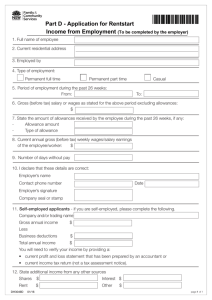
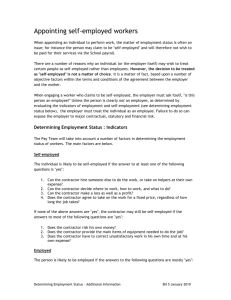
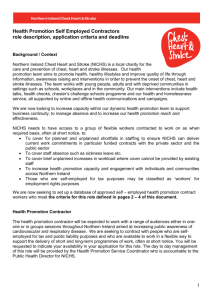
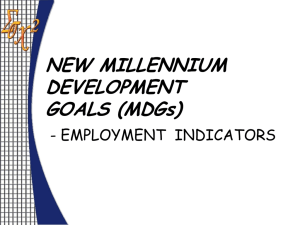
![Payment Protection Insurance - sample complaints letter [ 34 kb]](http://s3.studylib.net/store/data/007389999_1-805d992d8bb2c2dea2c669c2f61a82aa-300x300.png)